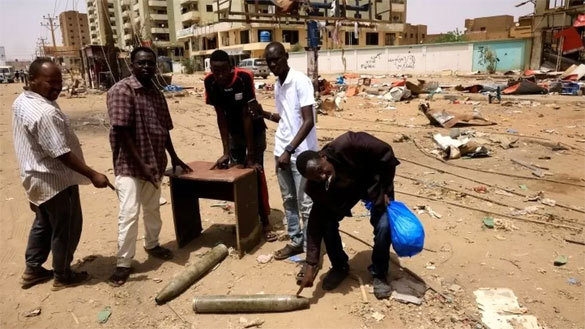Sudan Crisis: Is It Just A Power Struggle Between Two Leaders, Or Is It More?

By Ghulam
Ghaus Siddiqi, New Age Islam
1 May 2023
“Sudan Crisis
Runs Deeper Than Power Struggle”
Main Points:
1.
The armed conflicts between Sudan’s military and the Rapid Support
Forces (RSF) have created a sense of civil war in the nation.
2.
Until recently, the leaders of the two forces, Mohamed Hamdan Daglo and
Abdel Fattah al-Burhan were allies but what sparked the present unrest in
Sudan?
3.
The greatest issue is the significant number of lives lost in this
conflict. Both those who are killed and those who are killing are Muslims.
4.
The religion of both groups states that taking the life of one person is
the same as taking the life of all humanity, but they are not implementing this
teaching into their practice.
-----

People have
used the relative lull in fighting to go outside their homes (Reuters)
-----
When bullets
are fired, they are blind and do not recognise a civilian, a member of the
military, or a militia. Human instinct drives him to run away from the perils
he faces in an effort to survive. Sudan is currently experiencing similar
circumstances, where shots are being fired nonstop. The armed conflicts between
Sudan’s military and the Rapid Support Forces (RSF) have created a sense of
civil war in the nation. The conflict broke out on April 15, 2023, and has
resulted in hundreds of fatalities, a large evacuation of foreigners, and the
siege of more than 40 million people. Due to a lack of water, energy, and
communications as well as the collapse of the health system, the situation is
getting worse. The world has been eager to evacuate its citizens from Sudan
over the past few days. Headquarters of foreign missions and embassies are
being attacked and thousands of Sudanese citizens have attempted to cross into
neighbouring countries to flee their impending fate at home after it became
impossible to live there.
The
paramilitary RSF outfit, led by Mohamed Hamdan Daglo, and the Sudanese
military, under Abdel Fattah al-Burhan, are widely believed to be at war for
power.
Is this true,
or do we still need to know more about what sparked the present unrest in
Sudan?
In a column for CBS News, Haley OTT states:
Until recently, the leaders of the two forces, Mohamed Hamdan Daglo and Abdel
Fattah al-Burhan were allies. In 2019 they worked together to topple Omar
al-Bashir who ruled over the country for the last three decades. Following the
coup, a power-sharing government made up of civilian and military groups was
established. It was intended to monitor the transition to a fully civilian-run
administration after a few years of running Sudan. Al-Burhan, who had taken
over leadership of the power-sharing council, dissolved it in 2021 and
announced that elections would instead take place in 2023. Prior to the
anticipated restoration of civilian government, negotiations to combine the two
forces failed, which resulted in the ongoing conflict between the army and the
RSF. There were differences of opinion on who would be the superior general and
how quickly the RSF would be integrated into the Sudanese military. [Summarized
from https://www.cbsnews.com/news/sudan-war-fighting-2023-crisis/]
------------------------------------------------------------------
Also Read:
Sudan: Misplaced
Aspirations of Two Army Generals Turned A Country Into A Hell
------------------------------------------------------------------
According to Nima Elbagir, Tamara Qiblawi and
Amarachi Orie, CNN, A power struggle is at the centre of the fighting.
Sudib
Sontoran wrote a column for Daily Sabah under the headline “Sudan crisis runs
deeper than power struggle”. With reference to analysts, the author presented
the view that the issue in Sudan is varied and complex despite being viewed as
a power struggle because of its history of external interference and the
growing interest of regional and global powers in the region.
Mayada Kamal
Eldeen, a Sudanese political expert, argues that the present conflict is the
outcome of political concerns that began in 2019 after Omar al-Bashir was
toppled. The army and RSF staged a coup in 2021, overturning the transition to
civilian rule and installing al-Burhan as the de facto ruler.
However, a
breakdown in communication between the military and civilian institutions of
the state made the issue worse. An initial transition period of two years was
announced, and it was then extended by an additional two years. Eldeen contends
that during that time, civilians and the military were unable to come to an
agreement on important matters including the elections, the formation of a
civilian government, parliament and the choosing of a prime minister.
Eldeen
stressed both Sudan's strategic importance in the region and its enormous
natural resources. She claimed that before South Sudan's secession, Sudan,
which is today the third-largest country in Africa and has one of the longest
coasts on the Red Sea, was one of the largest nations in both Africa and the
Arab world. Because of Sudan's ports and military facilities, Russia and the
United States are at odds. Turkish officials regularly refer to Sudan as
"our gateway to Africa" and emphasise the importance of the country
due to its abundance of freshwater resources and perfect agricultural land. It
is also Africa's third-largest gold producer, and in previous years, the
national budget has benefited up to 40% from gold production. These factors
have brought on a lot of external attention and interventions for Sudan.
The crisis in
Sudan has received extensive coverage in global media, and Eldeen blamed
regional and international actors, such as the U.S., U.K. and Russia, as well
as regional powers like the UAE, Saudi Arabia and Egypt. These countries have
both intervened or exerted pressure on Sudan and its policies, particularly
after the overthrow of al-Bashir in 2019. Volker Perthes, the United Nations'
special envoy to Sudan, is also active in the country's political process and
negotiations, but their activities are often seen as negative interventions,
impeding stability in Sudan. Russia has established a presence in Sudan through
its mercenary group Wagner, which began its deployments during the rule of
former President al-Bashir and continued after his fall in partnership with a
Russian mining company.
Serhat Orakç,
a Turkish academic and a political analyst specializing in African
affairs, argued that the crisis may be deeper than just a power
struggle, as “the RSF has a history of profit-seeking by providing mercenary
soldiers to Libya and Yemen, controlling arms and car smuggling, investing in
real estate, and controlling gold mines”.
According to
Orakç, with a military force of more than 100,000, the RSF is a state inside a
state and an army within an army in Sudan. It aims to seize control of the
country's resources by assuming power on its own, refusing to give up its
gains.
Orakç
stressed how Sudan's natural riches and advantageous geographic location in
Africa give it geopolitical prominence and arouse others' curiosity. Sudan has
strong ties to the Middle East as a result of its subterranean resources,
including oil and gold, and its strategic location in Africa. Its importance is
further increased by the Red Sea's closeness and the Nile River's being there.
It is difficult to argue that what is happening in Sudan has nothing to do with
the economic, political, and geopolitical goals of regional and international
actors.
Orakç added
that working with regional players like the United Arab Emirates, Saudi Arabia,
Egypt, Israel, and Ethiopia, the US, Russia, and China are directing Sudan in
the direction of their own axes. After the Omar al-Bashir regime was toppled in
2019, Orakç continued, "It was well known that foreign players funded the
Sovereignty Council, which was predominated by military people and impeded the
civilian transitions.”
When Sudan
lost territories to South Sudan in 2011, it was divided. Orakç asserts that
South Kordofan and Darfur are occasionally experiencing similar trends. He
asserts that while the present crisis in the country would not cause a new
split in the near future, it might exacerbate the regional issues of Sudan.
Based on a state-backed paramilitary group in Darfur, the RSFs are at war with
the Sudanese Armed Forces at the moment. The Janjaweed militias
were established in Darfur to destroy separatist armed groups; under Omar
al-Bashir's leadership, they eventually changed their designations to Border
Forces and then to RSF. If this structure, which also has connections to Chad
and Libya, is dismantled, further security difficulties could arise in Sudan
and the surrounding countries.
Orakç
recognized the importance of Sudan for neighbouring Egypt. There are deep
historical, political, economic, and military-security ties between Egypt and
Sudan, and the Nile River makes this relationship strategic. Egypt supports the
Sudanese army and provides guidance in suppressing civilian groups who advocate
for civilian rule. The UAE and Saudi Arabia have tapped on RSF mercenaries to
support Libya’s Gen. Khalifa Haftar and to fight against the Houthis in Yemen.
Israel has also been known to establish relationships and cooperation with
conflicting parties in Sudan under the guise of normalization. According to
Orakç, this shows that conflicting parties are receiving financial and weapon
support from the same regional powers.
It is
difficult to assume from the viewpoints of Serhat Orakç and Mayada Kamal Eldeen
that the violence in Sudan is purely the product of a struggle for power.
However, the country's crisis is more complicated, multifaceted, and pervasive
than a simple power struggle. The main effect of the conflict is that it is
impeding the democratisation of the Sudanese government and the establishment
of a system of government based on the will of the people. [Summarized
from Sudan crisis runs deeper than power struggle: Analysts, Daily
Sabah]
The greatest
issue is the significant number of lives lost in this conflict. Both those who
are killed and those who are killing are Muslims. The teachings of this
religion, which are adhered to by both groups, declare that taking the life of
one person is the same as taking the life of all humanity, and saving the life
of one person is the same as saving the lives of all humanity. So both sides
should put an end to the conflict as soon as possible. Even though the
international community is already actively engaged in efforts to avert war in
Sudan, we urge them to contribute significantly and sincerely to permanently
ending the ongoing conflict.
------
A regular
columnist with NewAgeIslam.com, Ghulam Ghaus Siddiqi Dehlvi is a classical
Islamic scholar with a Sufi background and an English-Arabic-Urdu Translator.
URL: https://newageislam.com/current-affairs/sudan-crisis-struggle-leaders/d/129677
New
Age Islam, Islam Online, Islamic
Website, African
Muslim News, Arab World
News, South Asia
News, Indian
Muslim News, World Muslim
News, Women in
Islam, Islamic
Feminism, Arab Women, Women In Arab, Islamophobia
in America, Muslim Women
in West, Islam Women
and Feminism
